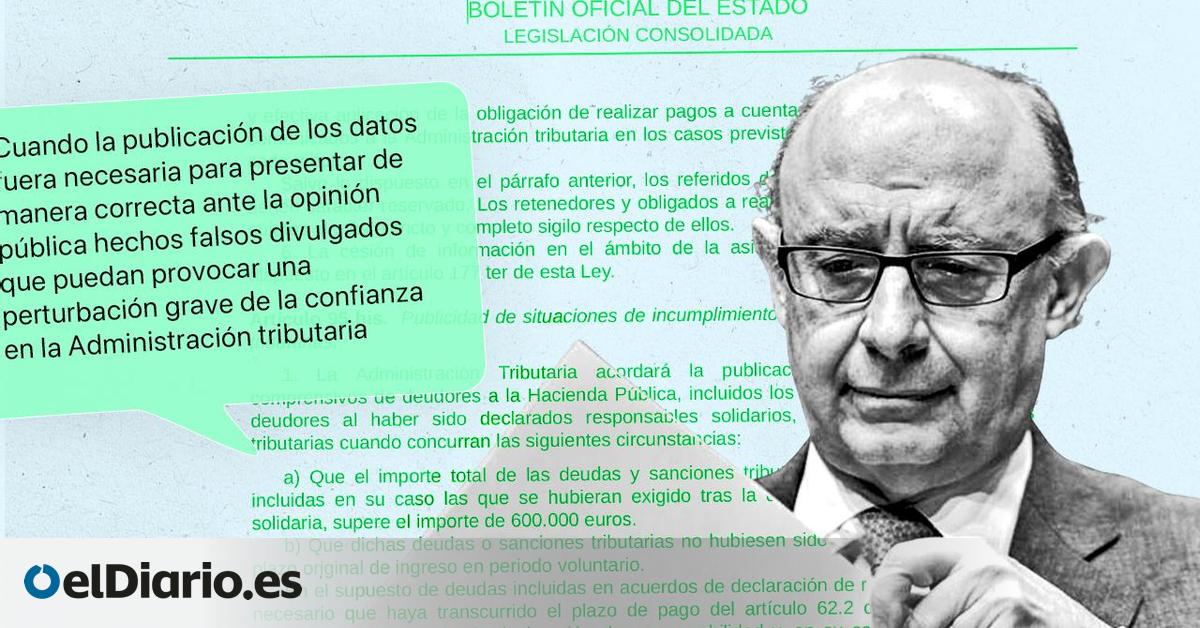
One of the emails incorporated into the case followed by a Judge of Tarragona against Cristóbal Montoro and nine of his collaborators in the Ministry of Finance reveals how that department came to write a legal reform that would have covered the publication of reserved information of taxpayers who had previously disseminated “false facts” against the Tax Agency.
The reform of the General Tax Law that was approved in 2015 finally allowed the Treasury to make public lists of large fraudsters, a practice that has continued over time. It was, as explained by the Ministry, “reasons of general interest and to fight fiscal fraud.”
Until now it had not transpired that Montoro also tried, without success, that the reform introduced a legal protection for the dissemination of reserved data of those who caused “a serious disturbance of confidence in the tax administration.”
In practice, the approval of that reform would have eliminated the limits imposed by Montoro when in public threatened certain groups, even concrete taxpayers, without mentioning anyone expressly, and always thanks to the reserved information they had as Minister of Finance. In the event that this extreme of the reform had been approved, it would have suffered a criticism of these people to the inspections suffered by the Tax Agency to be published by their fiscal files.
On May 13, 2014, the Deputy Director General of Planning, Regulations and Resources, Carlos Hernández, wrote an email to the General Director of Taxes, Diego Martín Abril-Calvo, the latter accused in the case of the Court of Instruction number 2 of Tarragona. That message was attached a title file “Note SGT Dissemination Tax data and note Art.95 LGT SEH”. He alluded to the reform planned by the Treasury Tax Law, in whose article 95 would include a BIS section for the publication of identities and amounts of delinquent.
According to this draft, article 95 bis would include a section that would establish that the Treasury could make public the tax information of a citizen in the following assumption: “When the publication of the data was necessary to present correctly before the public opinion false facts disseminated that can cause a serious disturbance of the trust in the Tax Administration.”
In the next paragraph of the draft appeared the key to who would have the power of decision in that case, which was none other than the Minister of Finance himself. “The publication of the Tax Information will require prior authorization of the body that is determined for tax administration in its regulatory standards. In the field of the State, the authorization will correspond to the Minister of Finance and Public Administrations,” the attached to the seized mail collected.
In the process of the reform of the General Tax Law, the PSOE tried to serve to know the identity of the taxpayers who had accepted the tax amnesty, but the absolute majority of the Popular Party rejected such a possibility.
The content of this email acquires relevance in the legal debate about whether the content of these emails seized contain more crimes than those attributed to Montoro and their collaborators for legislating in favor of gas companies. The summary of the case includes some of them in which it is evidenced how Montoro promptly received reserved information from political adversaries, personal enemies, party partners and any personality with public relevance.
Some of those mentioned in the emails, in the case of Esperanza Aguirre, Rodrigo Rato or Juan Carlos Monedero have tried without success to accept their personation in the case. All of them had indicated Montoro as responsible for leaks or instigators, in the case of a while or purse, tax and judicial investigations against them.
In two known cars this Thursday, Judge Rus rejects that the founder of Podemos, the former Minister and Rival of Montoro in the PP Rodrigo Rato and the ABC journalist Javier Chicote, of whom all of them the director of the Tax Agency sent data on fiscal inspections to the head of the Cabinet of Montoro, can appear in the case.
The arguments are similar in the different cars. The judge assumes the thesis of the prosecutor’s chief anti -corruption and considers that the reserved information only circulated between responsible for the Ministry and that, in some cases, it was detailed, it tells the minister, this responded to his hierarchical organization. Those affected can still resort to the Provincial Court of Tarragona.
With the refusal of the Anti -Corruption Headquarters to open that line of investigation, despite the indications that the emails collect, and the recent cars of the judge, the case circumscribes to the alleged corruption for the modification of laws by Montoro and their ministry in exchange for companies to hire economic team, the consultant he had founded and in which he had participated or would do so the high charges responsible for promoting the aforementioned legal modifications.
Source: www.eldiario.es

